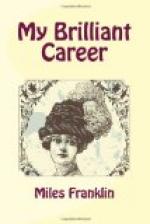I was not sufficiently ill to be miserable, and being a pampered invalid was therefore fine fun. Aunt Helen was a wonderful nurse. She dressed my foot splendidly every morning, and put it in a comfortable position many times throughout the day. Grannie brought me every dainty in the house, and sent special messengers to Gool-Gool for more. Had I been a professional glutton I would have been in paradise. Even Mr Hawden condescended so far as to express his regret concerning the accident, and favoured me with visits throughout each day; and one Sunday his gallantry carried him to a gully where he plucked a bouquet of maidenhair fern—the first of the season—and put them in a bowl beside my bed. My uncle Julius, the only other member of the family besides the servants, was away “up the country” on some business or another, and was not expected home for a month or so.
The Bossiers and Beechams were leaders of swelldom among the squattocracy up the country, and firm and intimate friends. The Beechams resided at Five-Bob Downs, twelve miles from Caddagat, and were a family composed of two maiden ladies and their nephew, Harold. One of these ladies was aunt Helen’s particular friend, and the other had stood in the same capacity to my mother in days gone by, but of late years, on account of her poverty, mother had been too proud to keep up communication with her. As for Harold Beecham, he was nearly as much at home at Caddagat as at Five-Bob Downs. He came and went with that pleasant familiarity practised between congenial spirits among squatterdom. The Bossiers and Beechams were congenial spirits in every way—they lived in the one sphere and held the one set of ideas, the only difference between them, and that an unnoticeable one, being that the Bossiers, though in comfortable circumstances, were not at all rich, while Harold Beecham was immensely wealthy. When my installation in the role of invalid took place, one Miss Beecham was away in Melbourne, and the other not well enough to come and see me, but Harold came regularly to inquire how I was progressing. He always brought me a number of beautiful apples. This kindness was because the Caddagat orchard had been too infested with codlin moth for grannie to save any last season.
Aunt Helen used to mischievously tease me about this attention.
“Here comes Harry Beecham with some more apples,” she would say. “No doubt he is far more calculating and artful than I thought he was capable of being. He is taking time by the forelock and wooing you ere he sees you, and so will take the lead. Young ladies are in the minority up this way, and every one is snapped up as soon as she arrives.”
“You’d better tell him how ugly I am, auntie, so that he will carry apples twelve miles on his own responsibility, and when he sees me won’t he vexed that all his work has been for nothing. Perhaps, though, it would be better not to describe me, or I will get no more apples,” I would reply.




